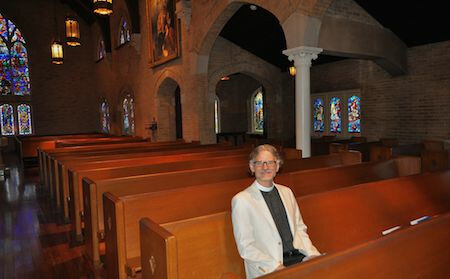The Great Atheist Manifesto

As a graduate student at Fordham University, I got to meet Herbert McCabe a couple of times when he would visit his Dominican compadre, Brian Davies. McCabe, both in his writing and his speech, was faithful to the thought of Thomas Aquinas while presenting it with wit and verve. I was telling him of my having figured out that, for Aquinas, to speak of the “eternal law” was just to speak of the being of God—that there is no difference between God himself and the unchanging eternal law that governs all things. McCabe said of course that’s right, provided (here I think his eyes glinted) we remember that we have no idea what God is!
Indeed, to have an idea of God is to commit an act of idolatry: for while we can know that God is, we cannot know what God is, but only what God is not. So I know (I really do know) that God is not a cat, and he is not a mighty fortress, and he is not the sun and the moon and the stars. He is not any of these things because all of these things are beings in the universe, that is to say, beings alongside other beings, and God is not one being alongside others. You’ll never have a line-up of four things, say, a cat, a fortress, a star, and God. You can’t line up God along with other things. McCabe says: God plus the universe do not make two.
McCabe, who was a socialist, once wrote that the greatest mystery of the universe is that God loves Margaret Thatcher. You can appreciate that line even if, like me, you happen to think more highly of Lady Thatcher than McCabe did.
But back to law. The most important part of the Ten Commandments, McCabe said, was the very beginning. McCabe paraphrased the opening of the Ten Commandments this way: “Hear, O Israel, there are no gods!” To say that the LORD is God alone is not to say that there are a bunch of candidates for being the real God, and the winner is Israel’s God, the LORD. Rather, it is to say that you don’t know what the word “God” means if you think it can be used in the plural.
The Decalogue, then—the Ten Commandments—is the Great Atheist Manifesto. It is our liberation from the presumptuous creatures who would claim to be gods, for they are not gods, they are just creatures. (Indeed, wicked, oppressive creatures; see again my earlier post on “Esther: idolatry.”) And that is the very deepest reason why the true law does not enslave us but sets us free. For the true law is nothing other than God himself, who gives us being, who supports us in every breath, who, as our creator, is closer to us than anything in the universe could be, closer indeed than our next heartbeat.
There are no gods; the LORD has made us free.
---
Out & About. This Sunday, October 9, I’ll be teaching on the giving of the Law at Church of the Incarnation. The class is at 10:15 a.m. in the Memorial Chapel: 3966 McKinney Ave., Dallas.
Then at 6 p.m. on Sunday, October 9, I’ll be speaking on “Thinking Theologically About Love and Disease.” This is also at Incarnation, in the education building: 3966 McKinney Ave., Dallas (RSVP ). The talk is about my book Losing Susan.
Sunday, October 16, I’ll be at St. Philip’s Church, preaching at the 9 a.m. and 11:15 a.m. services on “Myth Busters: I Must Obey the Law” (on how legalism or moralism can become an idol). I’ll also be teaching a class at 10:15 a.m.: 6400 Stonebrook Parkway, Frisco.
If you’d like to see Herbert McCabe, he is in this (unfortunately highly edited) video of an Oxford debate on the existence of God: https://www.youtube.com/watch?v=aivRDaTnx8M.

